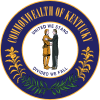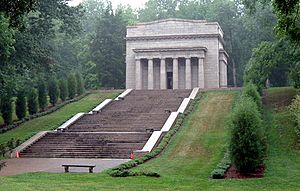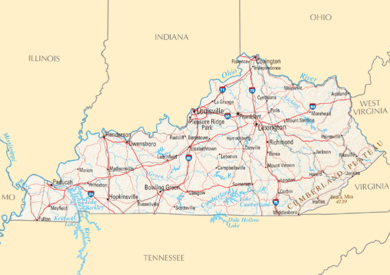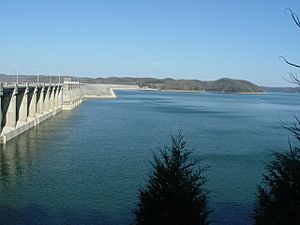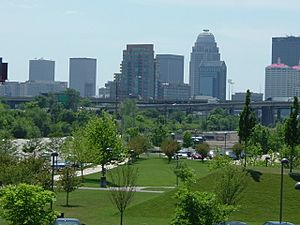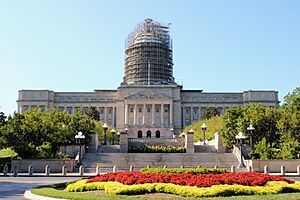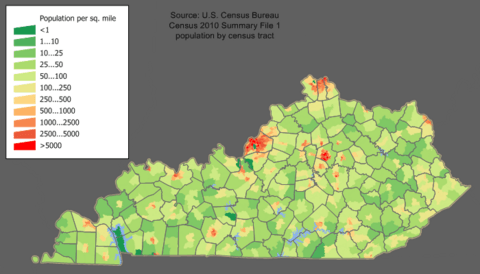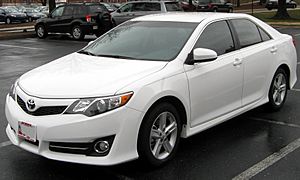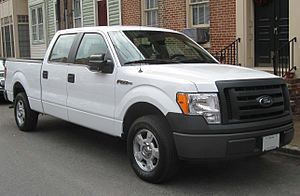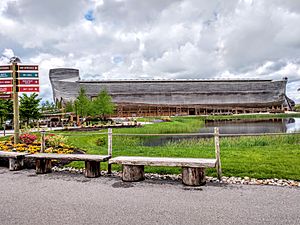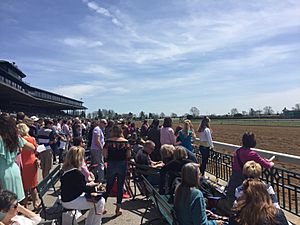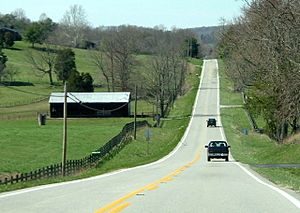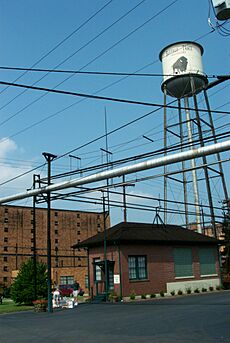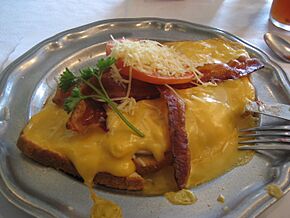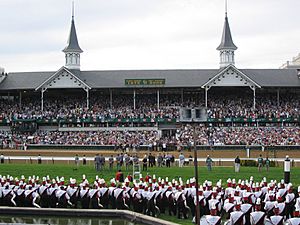Kentucky facts for kids
Quick facts for kids
Kentucky
|
|||
|---|---|---|---|
| Commonwealth of Kentucky | |||
|
|||
| Nickname(s):
The Bluegrass State
|
|||
| Motto(s):
United we stand, divided we fall
Deo gratiam habeamus (Let us be grateful to God) |
|||
| Anthem: My Old Kentucky Home | |||
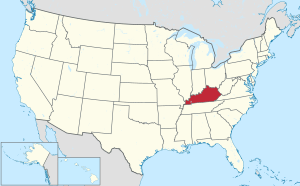
Location of Kentucky within the United States
|
|||
| Country | United States | ||
| Before statehood | Part of Virginia (District of Kentucky) | ||
| Admitted to the Union | June 1, 1792 (15th) | ||
| Capital | Frankfort | ||
| Largest city | Louisville | ||
| Largest county or equivalent | Jefferson | ||
| Largest metro and urban areas | Louisville | ||
| Legislature | General Assembly | ||
| • Upper house | Senate | ||
| • Lower house | House of Representatives | ||
| Judiciary | Kentucky Supreme Court | ||
| U.S. senators | Mitch McConnell (R) Rand Paul (R) |
||
| U.S. House delegation | 5 Republicans 1 Democrat (list) |
||
| Area | |||
| • Total | 40,408 sq mi (104,656 km2) | ||
| • Land | 39,486 sq mi (102,269 km2) | ||
| • Water | 921 sq mi (2,387 km2) 2.2% | ||
| Area rank | 37th | ||
| Dimensions | |||
| • Length | 397 mi (640 km) | ||
| • Width | 187 mi (302 km) | ||
| Highest elevation | 4,145 ft (1,265 m) | ||
| Lowest elevation
(Mississippi River at Kentucky Bend)
|
250 ft (78 m) | ||
| Population
(2024)
|
|||
| • Total | |||
| • Rank | 26th | ||
| • Density | 114/sq mi (44/km2) | ||
| • Density rank | 24th | ||
| • Median household income | $61,100 (2023) | ||
| • Income rank | 44th | ||
| Demonym(s) | Kentuckian | ||
| Language | |||
| • Official language | English | ||
| Time zones | |||
| eastern half | UTC−05:00 (Eastern) | ||
| • Summer (DST) | UTC−04:00 (EDT) | ||
| western half | UTC−06:00 (Central) | ||
| • Summer (DST) | UTC−05:00 (CDT) | ||
| USPS abbreviation |
KY
|
||
| ISO 3166 code | US-KY | ||
| Traditional abbreviation | Ky | ||
| Latitude | 36° 30′ N to 39° 09′ N | ||
| Longitude | 81° 58′ W to 89° 34′ W | ||
| Dance | Clogging |
|---|---|
| Bird | Cardinal |
| Fish | Kentucky spotted bass |
| Flower | Goldenrod |
| Tree | Tulip poplar |
| Insect | Western honeybee |
Kentucky, officially called the Commonwealth of Kentucky, is a state in the Southeastern United States. It doesn't touch the ocean, but it borders many other states like Illinois, Indiana, Ohio, West Virginia, Virginia, Tennessee, and Missouri. The Ohio River forms its northern border.
The capital city of Kentucky is Frankfort, and its biggest city is Louisville. About 4.5 million people live in Kentucky.
Kentucky became the 15th state in the U.S. on June 1, 1792, after separating from Virginia. It's known as the "Bluegrass State" because of a special green grass called Kentucky bluegrass. This grass was brought by early European settlers and helped the state become famous for its Thoroughbred horses.
Long ago, Kentucky was great for farming. This led to large farms, especially for tobacco, in the central and western parts of the state. Today, Kentucky is still good at farming, ranking high in goat and beef cattle production. But its economy has grown to include other things like making cars, producing energy, and having many medical facilities. Kentucky is a top state for assembling cars and trucks.
The state is home to the world's longest cave system at Mammoth Cave National Park. It also has the most navigable rivers and streams in the connected United States. Kentucky has two of the largest human-made lakes east of the Mississippi River. Some famous parts of Kentucky's culture include horse racing, bourbon, coal, automobile manufacturing, tobacco, Southern food, bluegrass music, and college basketball.
Contents
What's in a Name?
The name "Kentucky" comes from a Native American word. Before 1769, the area was known as "Kentucky country." It was named after the Kentucky River.
The exact meaning of the name is not fully known. One idea is that it comes from an Iroquoian word meaning "on the meadow" or "on the prairie." Another idea is that it comes from an Algonquian word, possibly meaning "Land of Our Fathers." The word aki means "land" in most Algonquian languages.
A Look Back at Kentucky's Past
Early People in Kentucky
People have lived in Kentucky for a very long time, with the first signs of humans dating back over 11,000 years. These early people were hunter-gatherers who used stone tools. Over time, they started farming. Around 900 CE, two main cultures, the Mississippian and Fort Ancient, developed in different parts of Kentucky. They grew crops like corn, beans, and squash.
When European explorers arrived in the 17th century, they found many Native American tribes living in Kentucky. However, by the mid-1700s, when more European settlers came, there were no large Native American villages left. This was partly because of wars and diseases brought by Europeans, which caused tribes to move or spread out.
Some early historians thought Native Americans only used Kentucky for hunting and didn't live there permanently. But newer studies show that people did live there for thousands of years. They built large settlements and earth mounds. The idea that it was just a "hunting ground" came about because many tribes had recently left the area due to big changes.
European Explorers Arrive
European explorers might have reached Kentucky as early as 1671. French explorers likely saw Kentucky while traveling on the Mississippi River. Early English explorers from Virginia also explored the land. Dr. Thomas Walker and Christopher Gist surveyed the area in the 1750s.
Settlers and Early Conflicts
As more settlers moved into Kentucky, there were conflicts with Native Americans over land. In 1774, James Harrod started Harrod's Town, which became the first lasting European settlement in Kentucky. Other settlements like Boone's Station and Lexington followed soon after.
Famous explorer Daniel Boone made his way through the Cumberland Gap and down the Kentucky River starting in 1767. He helped open up the bluegrass heartland for settlement.
Becoming a State
In 1776, the area that is now Kentucky became its own county, called Kentucky County, separating from Virginia. Over time, this large county was divided into smaller ones.
People in Kentucky wanted to become their own state. They asked Virginia and the U.S. government many times. Finally, on February 4, 1791, the U.S. Congress approved Kentucky's request. Kentucky officially became the 15th state in the Union on June 1, 1792. Isaac Shelby, a military veteran, was elected as its first Governor.
Farming and the Civil War
In central and western Kentucky, large farms grew tobacco and hemp. These farms often used enslaved people to do the work. During the 1800s, Louisville became a major place where enslaved people were sold and sent to other states.
During the American Civil War, Kentucky was a "border state," meaning it was a slave state but stayed neutral and officially part of the Union. However, some people in Kentucky supported the Confederacy. A group of people from 68 counties even formed a Confederate government for Kentucky, though it didn't have much power. Both Abraham Lincoln, the U.S. President, and Jefferson Davis, the Confederate President, were born in Kentucky.
After the Civil War
After the Civil War, Kentucky, like other Southern states, worked to rebuild. In the early 1900s, there were conflicts called the Black Patch Tobacco Wars. Tobacco farmers were upset because companies were paying too little for their crops. Some farmers formed a group called "Night Riders" who burned tobacco warehouses and sometimes hurt farmers who didn't join their boycott. The governor had to send in the Kentucky National Guard to stop the fighting.
Kentucky's Landscape
Kentucky is located in the Upland South region of the U.S. A big part of eastern Kentucky is in the Appalachian Mountains.
Kentucky shares borders with seven other states. Only Missouri and Tennessee border more states. Kentucky's northern border is the Ohio River, and its western border is the Mississippi River.
There's even a small part of Kentucky called Kentucky Bend that is completely surrounded by Missouri and Tennessee. You have to drive through Tennessee to get there!
Different Areas of Kentucky
Kentucky has five main natural regions:
- The Cumberland Plateau in the east, which has a lot of coal.
- The north-central Bluegrass region, where the biggest cities and the capital are.
- The south-central and western Pennyroyal Plateau.
- The Western Coal Field.
- The far-western Jackson Purchase area.
Kentucky's Weather
Kentucky has a humid subtropical climate, meaning it has hot, humid, and rainy summers, and moderately cold and rainy winters. Temperatures in summer usually reach about 87°F (31°C) during the day, and winter lows are around 23°F (-5°C). The state gets about 46 inches (117 cm) of rain each year.
Kentucky experiences all four seasons. Extreme cold or heat is rare. The northern parts of the state are usually a bit cooler than the western parts.
Natural Events
Kentucky has experienced several natural disasters, mostly related to weather. These include tornadoes, floods, and ice storms. Some of the most serious events caused many deaths and widespread damage across the state.
Rivers and Lakes
Kentucky has more miles of navigable waterways than almost any other state. It's bordered by three major rivers: the Mississippi River to the west, the Ohio River to the north, and the Big Sandy River to the east. Inside the state, important rivers include the Kentucky River, Tennessee River, and Cumberland River.
While Kentucky has only a few natural lakes, it has many large human-made lakes. Two of the biggest artificial lakes east of the Mississippi River are in Kentucky: Lake Cumberland (largest by water volume) and Kentucky Lake (largest by surface area).
Nature and Protecting the Environment
Kentucky has many different natural habitats and is home to unique plants and animals. It has some of the world's largest cave systems. However, human activities like farming and coal mining have impacted Kentucky's natural environment.
The state has a large park system, including a national park, national forests, and many state parks. Kentucky has also successfully brought back elk and wild turkey populations that were once almost gone from the state.
Fun Natural Places to Visit
- Cumberland Gap: A historic mountain pass.
- Cumberland Falls: Famous for its "moonbow" seen at night.
- Mammoth Cave National Park: The longest known cave system in the world.
- Red River Gorge: A beautiful area for hiking and climbing.
- Land Between the Lakes: A large recreation area.
- Black Mountain: The highest point in the state.
- Natural Bridge: A huge natural rock arch.
- Breaks Interstate Park: Known as the "Grand Canyon of the South."
- Blanton Forest: Kentucky's largest old-growth forest.
How Kentucky is Governed
Kentucky is one of four U.S. states called a "Commonwealth." This term was used by Virginia, where Kentucky came from. It means the state is governed for the good of all its people.
Kentucky is also one of only five states that hold elections for state officials in odd-numbered years.
The Executive Branch
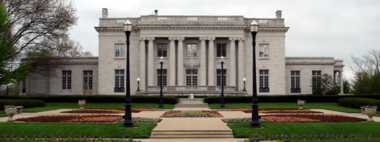
The governor is the head of the executive branch, like a president for the state. The lieutenant governor helps the governor. They are elected together for four-year terms.
The executive branch has many "cabinets" or departments, each led by a secretary. These departments handle things like transportation, economic development, health, and education.
Other elected officials include the Secretary of State and the Attorney General, who is the state's chief lawyer.
The Legislative Branch
Kentucky's laws are made by the Kentucky General Assembly. It has two parts:
- The Senate: The "upper house" with 38 members.
- The House of Representatives: The "lower house" with 100 members.
The Judicial Branch
Kentucky's court system is called the Kentucky Court of Justice. It includes:
- District Courts: For smaller cases.
- Circuit Courts: For more serious cases.
- Specialty courts like Family Court.
- The Kentucky Court of Appeals: Reviews decisions from lower courts.
- The Kentucky Supreme Court: The highest court in the state.
Judges in Kentucky are chosen by the people in elections, not appointed like federal judges.
Kentucky's Divisions
Counties
Kentucky is divided into 120 counties. The largest county by size is Pike County. The county with the most people is Jefferson County, where Louisville is located.
Each county has a government led by a County Judge/Executive and a group called a Fiscal Court, which makes decisions about the county's money and laws.
Major Cities
Kentucky's two largest cities, Louisville and Lexington, have combined their city and county governments. This means they have one government for both the city and the surrounding county area.
Here are some of Kentucky's biggest cities:
- Louisville (Jefferson County)
- Lexington (Fayette County)
- Bowling Green (Warren County)
- Owensboro (Daviess County)
- Covington (Kenton County)
- Georgetown (Scott County)
- Richmond (Madison County)
- Florence (Boone County)
- Elizabethtown (Hardin County)
- Hopkinsville (Christian County)
- Nicholasville (Jessamine County)
- Independence (Kenton County)
- Frankfort (Franklin County) - the state capital, but smaller than many other cities.
More than half of Kentucky's population lives in the "Golden Triangle" area, which includes the Louisville, Lexington, and Northern Kentucky (Cincinnati area) metro regions. This area is important for the state's economy and growth.
People of Kentucky
In 2020, about 4.5 million people lived in Kentucky. The state's population has grown steadily over time.
Most people in Kentucky are white. About 8% of the population is African American, mostly living in cities like Louisville and Lexington. The number of Hispanic and Asian residents in Kentucky has also been growing.
Languages Spoken
Most people in Kentucky speak English at home. Spanish is the second most common language. The way people speak English in Kentucky often sounds like a mix of Southern and Midland American English.
Religions in Kentucky
Kentucky is mostly Christian, especially Protestant. Many churches and seminaries (schools for religious studies) are located here. The Southern Baptist Theological Seminary in Louisville is a very important school for Southern Baptists.
Louisville is also home to the Cathedral of the Assumption, one of the oldest Catholic cathedrals in the U.S. The city also has Jewish, Muslim, and Hindu communities.
The Creation Museum and Ark Encounter, which are popular attractions for Christian creationists, are located in northern Kentucky.
Kentucky's Economy
Kentucky was first known for its great farming. It had the first commercial winery in the U.S. and became a major horse breeding area because of its special soil. Today, Kentucky is still a top state for goat and beef cattle farming and corn production. It has also been a big center for the tobacco industry.
Kentucky's economy has grown beyond farming. It's now a major player in making cars. The state ranks 4th in the U.S. for assembling cars and trucks. Many well-known cars like the Chevrolet Corvette and Toyota Camry are made here.
Kentucky has a long history of coal production, but this industry has been shrinking. The state also produces 95% of the world's bourbon whiskey. There are more than 5.7 million barrels of bourbon aging in Kentucky, which is more than the state's population!
Kentucky exports many products and services to countries around the world. In 2012, these exports were worth $22.1 billion.
Fort Knox, a U.S. Army base, is famous for holding a large part of the United States' official gold reserves. It's located between Louisville and Elizabethtown.
Taxes in Kentucky
Kentucky has a flat 4% income tax rate. The sales tax rate is 6%. Property taxes are also collected, but they make up a smaller part of the state's income now.
In 2023, Kentucky started allowing regulated sports betting, both in person and online, which brings in tax money for the state.
Tourism in Kentucky
Tourism is very important to Kentucky's economy. People visit for:
- Horse Racing: Events like the Kentucky Derby and races at Keeneland Race Course.
- Bourbon Tours: Visiting distilleries along the Kentucky Bourbon Trail.
- Natural Attractions: Places like Mammoth Cave, Lake Cumberland, and Red River Gorge.
- Religious Destinations: The Creation Museum and Ark Encounter.
The Horse Industry
Horse racing is a big part of Kentucky's identity. Churchill Downs in Louisville hosts the famous Kentucky Derby every May. Keeneland Race Course in Lexington also holds major races and horse auctions. The Kentucky Horse Park in Georgetown hosts equestrian events and offers horseback riding.
Learning in Kentucky
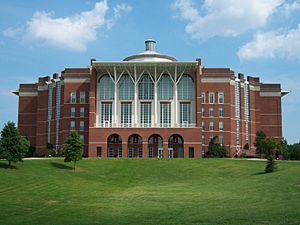
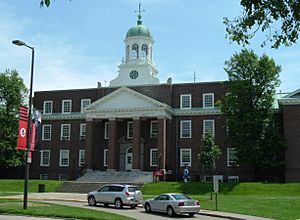
Kentucky has eight public four-year universities. The two main research universities are the University of Kentucky (UK) and the University of Louisville (UofL). UK is the state's main university and has agriculture services in every county. UK and UofL also share duties for medical outreach across the state.
There are also 16 public two-year colleges, which are part of the Kentucky Community and Technical College System.
Transylvania University in Lexington was founded in 1780, making it the oldest university west of the Allegheny Mountains.
Berea College was the first college in the South to allow both Black and white students when it opened in 1855. A state law later forced it to separate students by race, but this law was removed in 1950, and Berea went back to being integrated.
Kentucky has 173 school districts and over 1,200 public schools. In 1989, the state's education system was found to be unconstitutional, leading to a big reform called the Kentucky Education Reform Act (KERA). This law has helped improve education in Kentucky.
Getting Around Kentucky
Roads
Kentucky has six major Interstate highways and several parkways. The parkways used to charge tolls, but these were removed in 2006, making travel easier. The speed limit on rural interstates and parkways is 70 mph (113 km/h).
Trains
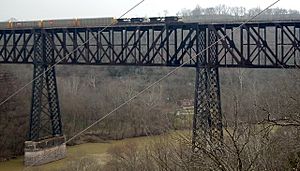
Amtrak, the national passenger train system, has stops in several Kentucky cities. Most train lines in Kentucky are used for moving cargo, especially coal.
The "My Old Kentucky Dinner Train" in Bardstown offers a special dining experience on a historic train route. Old train lines are also being turned into walking and biking trails, like the Big Four Bridge in Louisville, which is one of the longest pedestrian-only bridges in the world.
Airports
Kentucky's main airports are Louisville International Airport, Cincinnati/Northern Kentucky International Airport (CVG), and Blue Grass Airport in Lexington. Louisville International is home to UPS's Worldport, a huge international package sorting center. CVG is the largest airport in the state and is a major hub for cargo airlines like DHL.
Water Travel
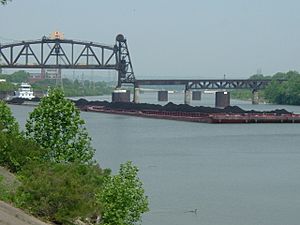
Because Kentucky is bordered by two large rivers, water transportation has always been important. Louisville was a big port for steamships long ago. Today, barges mostly carry coal from Kentucky's coal fields. Many large ports are located on or near Kentucky's rivers.
Kentucky's Culture
Kentucky's culture is mostly Southern, but it also has influences from the Appalachian Mountains. It's famous for bourbon, tobacco, horse racing, and college basketball. Many people in Kentucky have English, Irish, and German ancestors.
Kentucky was a slave state, but it didn't have as many enslaved people as some other Southern states. After the Civil War, Kentucky had laws that separated people by race, but these laws were later changed.
Kentucky celebrates Confederate Memorial Day on June 3. The Kentucky Derby Festival in Louisville is a big two-week event leading up to the Kentucky Derby horse race. It includes fireworks, parades, and other fun activities.
Louisville also hosts the Kentucky State Fair and the Kentucky Shakespeare Festival. Bowling Green is home to the National Corvette Museum, celebrating the famous sports car made there. Owensboro is known as the "Barbecue Capital of the World" and hosts an annual barbecue festival.
Old Louisville is a historic neighborhood with beautiful Victorian architecture. It hosts a large outdoor art show.
Winchester celebrates Beer Cheese, a local food, with its annual festival.
Music of Kentucky
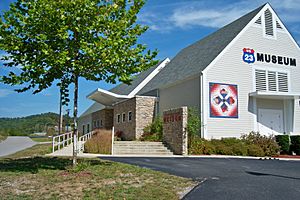
Kentucky is known as the "Country Music Capital" and is especially famous for Bluegrass music. Bill Monroe, often called "The Father of Bluegrass," was born in Kentucky. Many other famous bluegrass musicians are from the state. The Bluegrass Music Hall of Fame & Museum is in Owensboro.
Many other famous musicians are from Kentucky, including country stars Loretta Lynn and Chris Stapleton, and rock bands like My Morning Jacket and Cage the Elephant. Rosemary Clooney, a famous singer and actress, was also from Kentucky.
Kentucky Stories
Kentucky has a rich history in Southern and American literature. Writers from Kentucky often tell stories about working-class people, rural life, and nature. Famous books include Uncle Tom's Cabin by Harriet Beecher Stowe and All the King's Men by Robert Penn Warren.
Author Thomas Merton lived and wrote many of his books at a monastery in Kentucky. Hunter S. Thompson, a well-known writer, was also from the state.
Kentucky Food
Kentucky's food is part of traditional Southern cooking. One unique Kentucky dish is the Hot Brown, an open-faced sandwich with turkey, bacon, and a special sauce, created at the Brown Hotel in Louisville. The Old Fashioned drink was also invented in Louisville. Western Kentucky is known for its special style of barbecue, and Central Kentucky is where Beer Cheese was created.
Harland Sanders started Kentucky Fried Chicken (KFC) at his service station in Kentucky.
Sports in Kentucky
Kentucky has several minor league baseball teams. For major league sports, many fans in northern Kentucky support teams in nearby Cincinnati, Ohio, like the Cincinnati Bengals (football) and Cincinnati Reds (baseball).
College sports are very popular in Kentucky. The Kentucky Wildcats, Western Kentucky Hilltoppers, and Louisville Cardinals are among the best college men's basketball teams in the U.S., with many national championships.
The Kentucky Derby is a world-famous horse race held every year in Louisville. The Valhalla Golf Club in Louisville has hosted major golf tournaments. The Kentucky Speedway used to host NASCAR races.
Louisville City FC is a professional soccer team that plays in Louisville.
Kentucky Colonel
Being named a Kentucky colonel is the highest honor given by the state. The Governor and Secretary of State give this title to people who have done great things for their community, state, or country. Kentucky colonels are considered official goodwill ambassadors for the state.
Images for kids
See also
 In Spanish: Kentucky para niños
In Spanish: Kentucky para niños
 | Stephanie Wilson |
 | Charles Bolden |
 | Ronald McNair |
 | Frederick D. Gregory |



